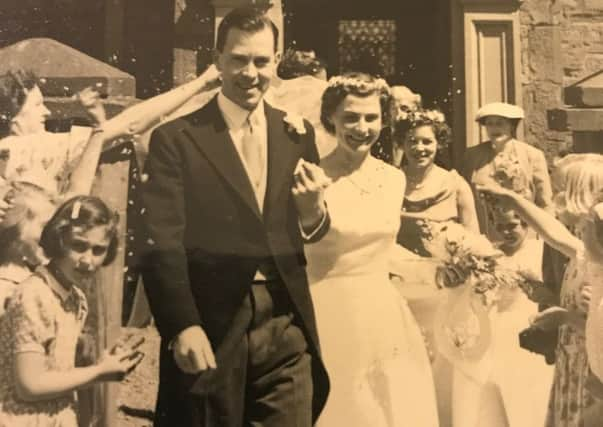Harry Sheldon: RAF veteran, lawyer, Honorary Sheriff and governor of Castle Huntly borstal


From Bomber Command to public bar, Sheriff’s bench and his own community, Harry Sheldon was a man who valued and was defined by service.
His was a generation for whom the call of duty permeated life, in his case from childhood, when he took on the role of man of the house after his father’s death, until his last few years when, as an elderly pensioner, he assisted with Meals on Wheels.
Advertisement
Hide AdAdvertisement
Hide AdIn between he survived the being killed, maimed or captured as an Allied airman on Lancaster bombers during the Second World War, qualified as a lawyer while working evenings in his mother’s pub and became an Honorary Sheriff following long and respected service as a notable figure in the legal profession – an impressive feat for a youngster from Leith who grew up without privilege or connections.
He was the son of Kate and Edmund Sheldon, a wine and spirit merchant who died before his son had reached his teens. The youngster studied at the city’s Royal High School.followed by an apprenticeship with legal firm Shepherd & Wedderburn where he worked while studying for his Bachelor of Laws degree at Edinburgh University.
By this time war had broken out and Sheldon joined the University’s air squadron. He volunteered for the RAF in 1943, training as a navigator on twin-engined Avro Ansons at Rivers, Manitoba, and returning to Britain in November of that year.
Following further intensive training he was assigned to Bomber Command’s 5 Group – motto Undaunted – and flew combat missions with 57 Squadron in the four-engined Lancaster heavy bombers based at East Kirby in Lincolnshire. His first operation over Germany was a raid on Hamburg’s satellite city of Harburg and its industrial area on November 11, 1944. He was 22, the average age of Bomber Command aircrew, of whom more than 55,500 were lost in the conflict.
A few days later he was over Duren for Operation Queen, a heavy aerial bombardment to support ground troops breaking through the Ruhr River. Just days later, he flew in one of 138 Lancasters to make the first serious raid on the Mittelland Canal near Gravenhorst. It would take several trips before the waterway was finally declared unserviceable later that winter – Sheldon would spend New Year’s Day 1945 in the air bombing the same target.
He survived more than 20 missions, including raids on Giessen, Munich, Karlsruhe and, possibly most controversial of all, on Dresden during Operation Thunderclap.
Almost 800 Lancasters dropped thousands of tons of bombs on rail yards and supply depots there, turning the city into a devastating firestorm.
Although the courageous Bomber Boys made a crucial contribution to defeating Nazism, the legacy of doing his duty continued to haunt Sheldon down the years and he remained profoundly troubled by the war’s civilian victims.
Advertisement
Hide AdAdvertisement
Hide AdFollowing VE Day he was assigned to Tiger Force, in preparation for the proposed invasion of Japan but the dropping of the atomic bombs ended the war and he moved to 49 Squadron on more routine flights, disposing of incendiary bombs and bringing home troops and former PoWs, many from the Italian port of Bari.
After demob he graduated and completed his apprenticeship in 1947 while working evenings in his mother’s pub, The Lorne Bar, in Leith, moving seamlessly from legal jargon to football chat with the local working men.
After securing a job as an assistant solicitor with Dundee firm H & H J Carlton he met his future wife, Muriel, at a concert in Dundee’s Caird Hall.
They married in 1957 and went on to have four children suffering the immense heartache of losing one little daughter, Elizabeth, as a baby.
Conscientious and well-read, with an exceptional memory and keen forensic mind, Sheldon was rarely to be seen without a book in his hand.
He worked his way up to partner in the firm which became Carltons and subsequently part of today’s Blackadders. One of the last of law’s generalists, he worked long hours to help clients in employment and family cases, as well as carrying out conveyancing and other chamber work.
Elected to the Council of the Law Society of Scotland, he also served as Dean of the Dundee Faculty of Procurators and Solicitors and was made an Honorary Sheriff where, grave-faced and bushy-browed, he could appear a somewhat forbidding figure on the bench.
He combined this busy professional life with service to the community as an Invergowrie and Kingoodie community councillor in the 1970s and Invergowrie Church’s Kirk Session treasurer for many years.
Advertisement
Hide AdAdvertisement
Hide AdHe served as a governor of Castle Huntly where, when it was a borstal, he happily chatted to the young inmates, actively encouraging them to improve their lives through education and employment.
Following retirement in 1989 he continued to contribute locally – as chair of the Tayside Health Board Medical Ethics Committee, overseeing proposals for clinical research and, latterly, with Meals on Wheels, delivering food along with his own generous brand of company and conversation to those less fortunate than him.
Predeceased by his wife and their baby daughter, he is survived by two daughters Alison and Angela, son David and five grandchildren.
ALISON SHAW